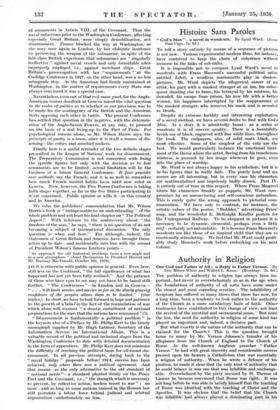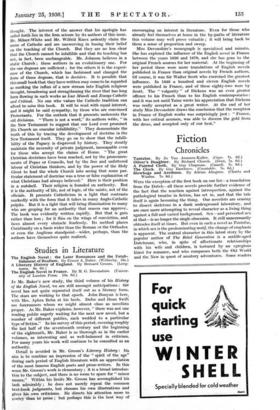Authority in Religion
One God and Father of All : a Reply to Father Vernon. 'By Eric Milner-White and Wilfrid L. Knox. (Mowbray. 2s. tkl.) Tax problem of authority in religion has always been im- portant, but never so overwhelmingly so as in the age when the foundations of authority of all sorts have come tinder the closest and most corroding scrutiny. The infallibility of Scripture has suffered so many blows that there has now, for a long time, been a tendency to look rather to the authority of the Church as a more satisfactory basis of faith. Other tendencies have contributed to this change of view, not least the revival of the mystical and sacramental sense. But none the less, the need for authority in religion of some kind has played an important and, indeed, a decisive part.
But what exactly is the nature of the authority that can be claimed for the Church ? This is the question brought home to many by Mr. Vernon Johnson's transfer of his allegiance from the Church of England to the Church of Rome. As the well-known Anglican preacher " Father Vernon " he had with great sincerity and considerable success pressed upon his hearers a Catholicism that was essentially a religion of authority. When he wrote a defence of his position, he made it clear that the only kind of authority that he could believe in was one that was infallible and unchange- able. Overwhelmed by the piety aroused by St. Therese of Lisieux he became convinced that Rome was right. It was not long before he was able to satisfy himself that the teaching of Rome was identical "with the teaching of Christ and the Apostles. It was obvious that the belief that the Church
was infallible had allays played a dominating part in his
. , thought. The interest of the answer that his apologia has called forth lies in the firm seizure by its authors of this issue.
Mr. Milner-White and Mr. Wilfrid Knox ardently claim the name of Catholic and are unswerving in basing their belief
on the teaching of the Church. But they are no less clear that the Church cannot be infallible and that its teaching has not, in fact, been unchangeable. Mr. Johnson believes in a static Church ; these authors in an evolutionary one. For the one dogmas are sufficient ; for the others it is the experi- ence of the Church, which has fashioned and changed the form of those dogmas, that is decisive. It is possible that this small book that they have written may come to be regarded as marking the influx of a new stream into English religious thought, broadening and strengthening the river that has long been flowing in such works as Lux Mundi and Essays Catholic and Critical. No one who values the Catholic tradition can afford to miss this book. It will be read with equal interest, and it might be said sympathy, by those who are convinced Protestants. For the outlook that it presents undercuts the old divisions. " There is not a word," its authors write, " in the New Testament to suggest that our Lord ever promised His Church an oracular infallibility." They demonstrate the truth of this by tracing the development of doctrine in the New Testament itself. They go on to show that the infalli- bility of the Papacy is disproved by history. They stoutly maintain the necessity of private judgment, inescapable even for those who accept the claims of Rome. " The great Christian doctrines have been reached, not by the pronounce- ments of Popes or Councils, but by the free and unfettered labour of Christian thinkers, and by the power of the Holy Ghost to lead the whole Church into seeing that some par- ticular statement of doctrine was a true or false explanation of what Christians had always believed." Here is their position in a nutshell. Their religion is founded on authority. But it is the authority of life, not of logic, of the saints, not of the officials. It presents Catholicism in a light that contrasts markedly with the form that it takes in many Anglo-Catholic pulpits. But it is a light that will bring illumination to many who are groping for an authority that reason can approve. The book was evidently written rapidly. But that is gain rather than loss ; for it flies on the wings of conviction, and faces almost every obstacle fearlessly. Its method places Christianity on a basis wider than the Roman or the Orthodox or even the Anglican standpoint—wider, perhaps, than the authors have themselves quite realized.







































 Previous page
Previous page